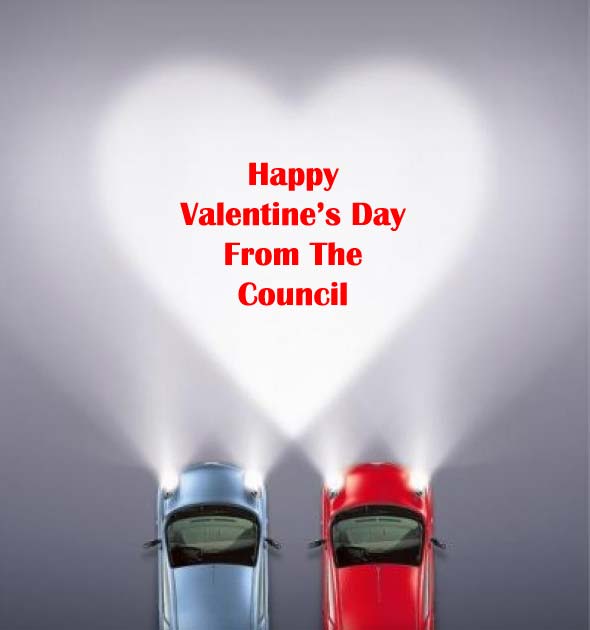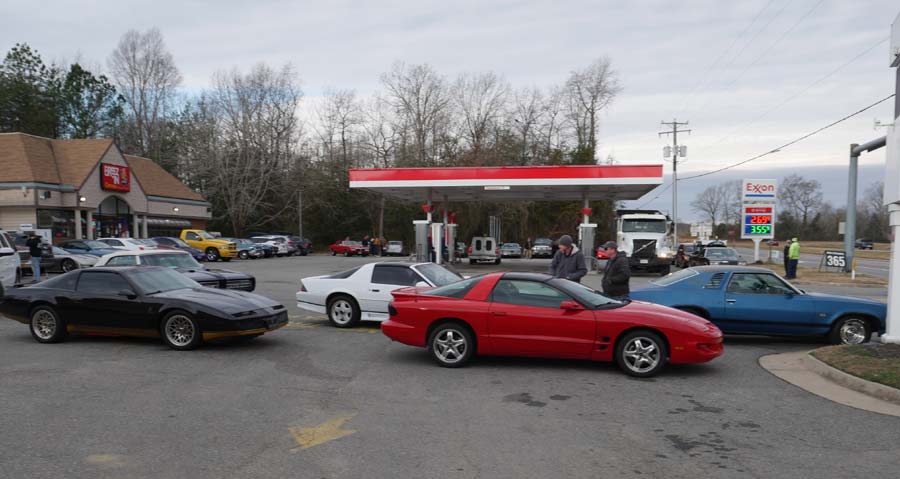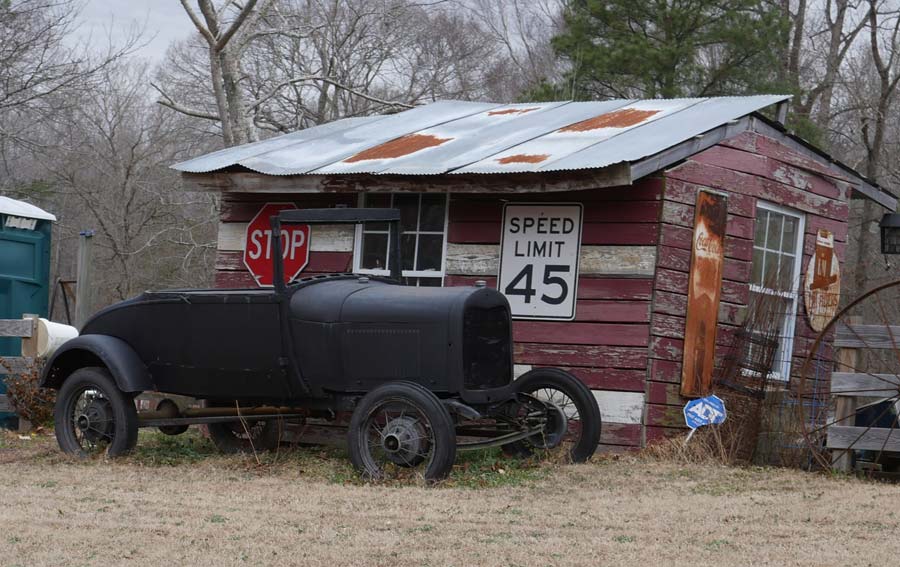
| Home | Photos | Calendar | Newsletter | Members | Info | Join | About | Links | Contact |
"The Relay" Online Newsletter
|
 |  |
 |  |
 |  |
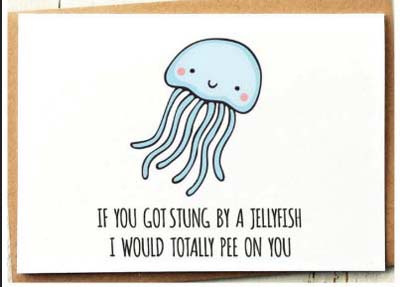 |  |
 |  |
 |  |
Rhode Island might ditch Mr. Potato Head license plates after Hasbro moves to Boston
From AP
It’s been no small potatoes that Rhode Islanders have been able to choose the image of Mr. Potato Head as a specialty license plate for decades.
Yet with Hasbro’s decision to move its headquarters from the smallest state in the U.S. to Boston, two lawmakers say it’s time to hash out whether Rhode Island should continue promoting one of the company’s most iconic characters.
Under the proposal introduced earlier this month, Rhode Island’s Division of Motor Vehicles would stop providing Mr. Potato Head as an option for a specialty license plate. Currently the plate costs around $40, with half of that amount going to help support the Rhode Island Community Food Bank.
Rep. Brian Newberry, a Republican from North Smithfield, said in an email that he filed the legislation because Hasbro leaving the state will cause “untold economic harm and loss of tax revenue.”
“There is no reason we should be advertising their products on our license plates,” Newberry said. “It may seem trivial compared to many other things but it’s a matter of self-respect.”
Mr. Potato Head license plates were first issued in 2002 to commemorate the 50th anniversary of the beloved toy, which notably has appeared in the “Toy Story” films. The plates include a small image of Mr. Potato Head holding a sign of the Rhode Island Community Food Bank and “help end hunger” at the bottom of the plate.
“The license plate started at a time when Mr. Potato Head was all over the state and was having a moment,” said Kate MacDonald, spokesperson for the food bank, which has received nearly $60,000 over the years due to the plate. “And while it has tapered off over the years, it’s been a steady way for people to contribute.”
An email was sent to Hasbro seeking comment. The toy company announced last year that it would be moving to Boston by the end of 2026 after operating in Pawtucket, Rhode Island, for nearly 70 years.
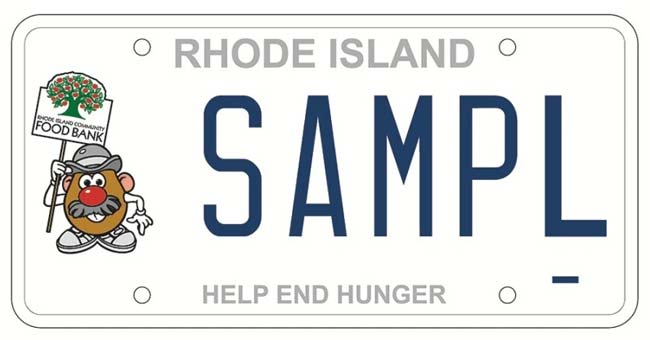
Lew Pryeor, who helps collect and distribute food donations to hungry Rhode Islanders, said he was upset when he heard about Newberry’s bill.
“My concern is, any cuts into the food programs is gonna affect some people,” said Pryeor, who lives just north of Providence, the state capital, and often sees people of different backgrounds who need help finding a warm meal.
“For him to say that he doesn’t like the plates, well, that’s your prerogative,” he added. “Don’t buy them. If it’s making money for the state, let it.”
Mr. Potato Head has been around since the 1950s, when the original toy didn’t come with a plastic potato. Instead, kids had to supply their own vegetable to poke eyes, a nose or mustache into.
Notably, Mr. Potato Head was the first toy advertised on television in 1952. A Mrs. Potato Head was launched in 1953, followed by brother Spud, sister Yam, and various pets and accessories, according to the National Museum of Play.
Hasbro adopted a plastic spud after new government regulations prevented certain toys from having pointed sharp edges, as well as complaints about children playing with rotting vegetables.
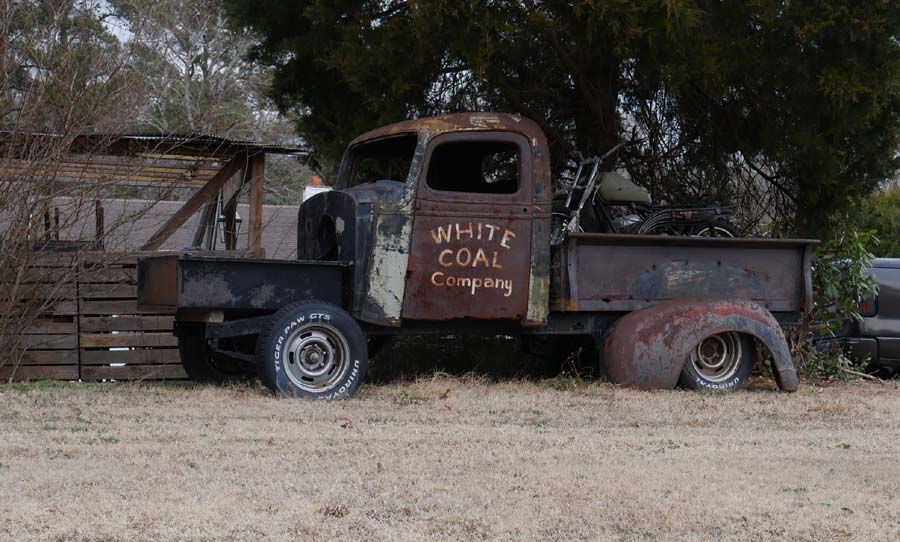
This pickup was next to the roadster on the Polar Bear Run
Jewels Found On Ebay
Here are a couple of hot finds from Ebay Motors.
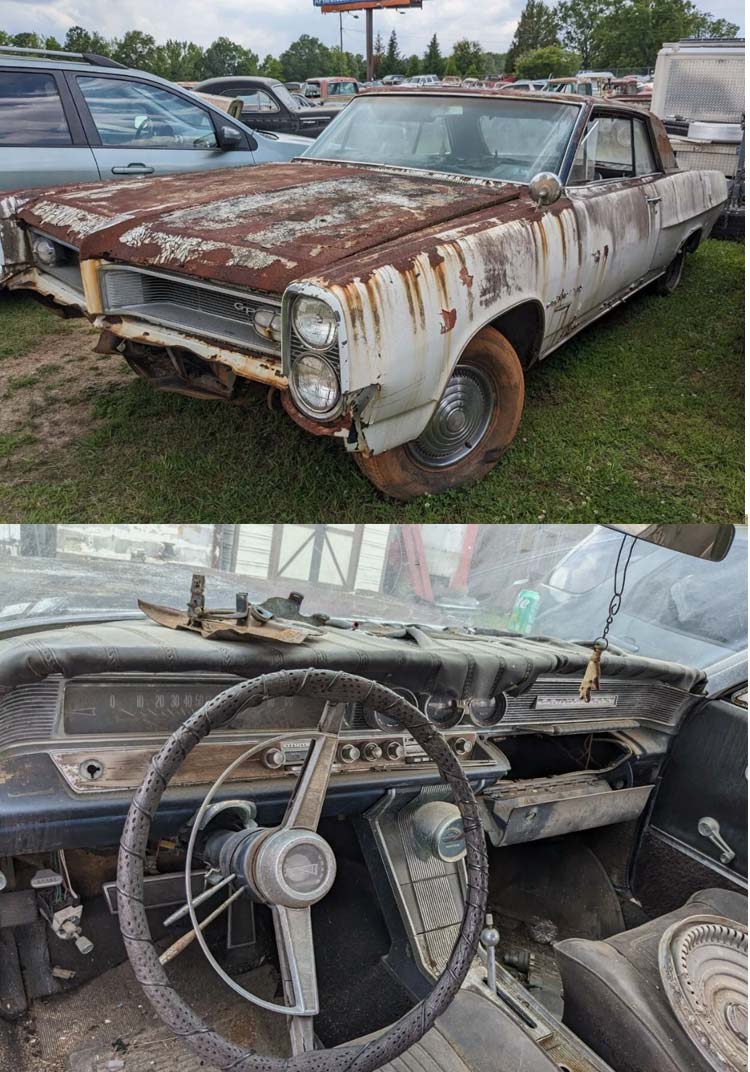
eBay item number: 127601020766
$2500
eBay description: You are looking at a 1964 Pontiac Grand Prix 2-Door with front power bucket seats... no engine or trans but would make a good restoration project or use for parts! I feel that my price of $2,500 (REDUCED DOWN FROM $3,500) is very realistic for a classic vehicle like this one with the potential that this vehicle has.
The Pontiac Grand Prixs were very nice cars - many years ago. This one wants to escape the bone yard but is missing engine, transmission, bumpers and more. Plenty of that "patina" or rust as we used to call it. And it has been reduced! You can get a running driving one in decent shape for 30K. Unless you are desparate for parts you may wish to pass on this one.
Next up is a "project".
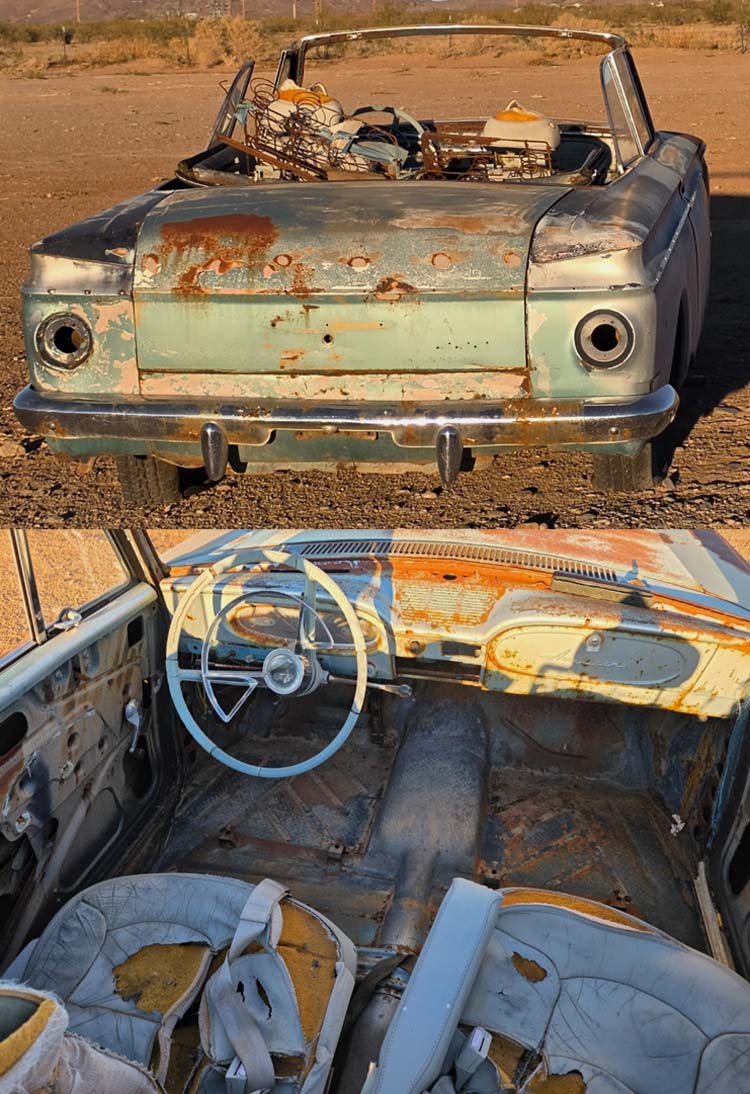
eBay item number: 227134548894
$1295
eBay description: The 1962 AMC Rambler is a classic convertible car with a sleek body design and a nostalgic charm. This is a .project or parts car. The clean title adds to its authenticity and appeal, making it a desirable choice for collectors and car enthusiasts looking for a unique piece of automotive history. It does have a clear Oregon title. It has many of the trim pieces as well as the majority of the hubcaps included. This is really a great deal on a RARE car.
A Rambler escaped from its home in Oregon and is stranded in the New Mexico desert. Somehow it managed to get rusty in that desert. It is missing the head off the engine but does come with some of its bits and pieces. The big bonus is that the "clean title adds to its authenticity and appeal, making it a desirable choice for collectors and car enthusiasts looking for a unique piece of automotive history" plus it is a RARE car. This is a Rambler American and Rambler made of lot of them and quite a few convertibles due to the low price. Production for the 1962 model year totaled 125,678 Rambler Americans of which almost 13,500 were convertibles. That's not rare.
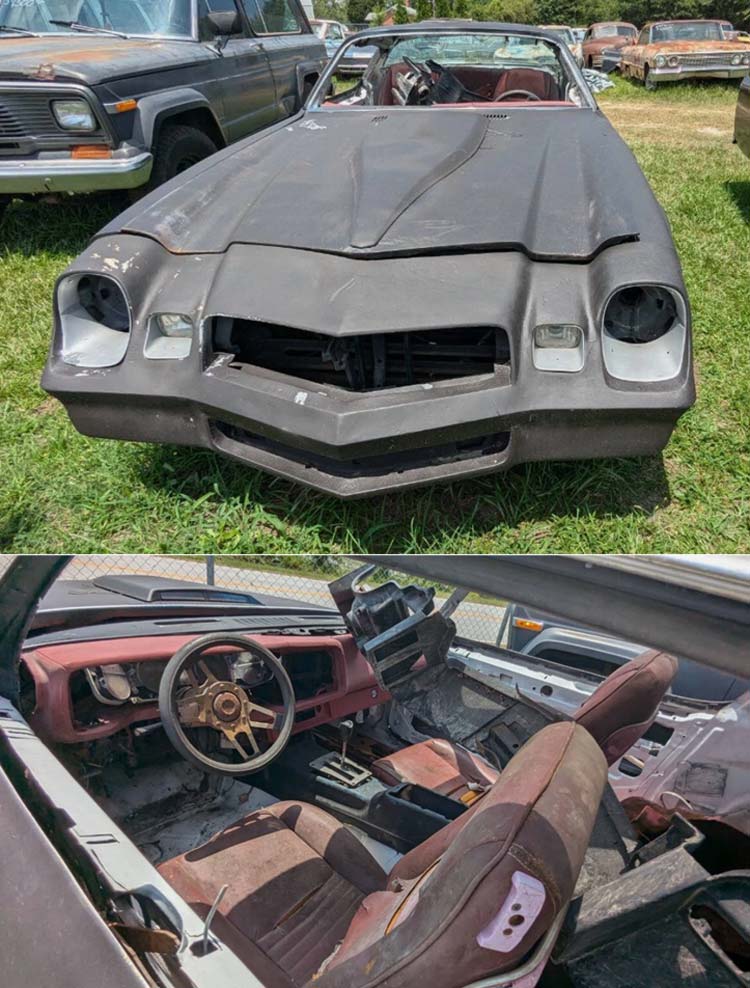
eBay item number: 127601020786
$8500
eBay description: You are looking at a 1980 Chevrolet Camaro project. This is a solid car with a 350 V8, automatic transmission and T-Tops. Needs some work but would make a great starter car. I feel that my price of $8,500 is very realistic for a classic vehicle like this one with the potential that this vehicle has.
Needs some work - looks like a ton of work. Why do they take out the headlights first? Did someone need a light? It's missing the grill, windshield and the interior looks like a Texas tornado hit it. The seller says it has an engine but there were no photos. Might be a good reason for no photos. It has been in a junkyard and parts have been removed. And it has the dreaded leaking t-tops.

This pickup with motorcycle and skelton was also spotted on the Polar Bear Run
Dodge Hornet Squashed on the American Market
From Hagerty
Dodge resurrected the decades-old Hornet name for 2023 on a small, city-friendly crossover that shared its Italian DNA with the Alfa Romeo Tonale. The Hornet allowed the brand to plant its stake in a lucrative segment of the market, but the model never caught on, and now the Dodge Hornet has officially been canceled.
“Production of the Hornet, built in Italy, has ended due to shifts in the policy environment,” a company spokesperson told Hagerty. While the spokesperson didn’t provide additional details, that’s likely an allusion to the tariffs targeted at imported cars. The spokesperson added that current Hornet owners will continue to receive customer support, service, parts, and warranty coverage in the foreseeable future. Interestingly, we reached out to Alfa Romeo, and the Tonale will remain available in the U.S. market for 2026 with the 2.0-liter turbo gas engine.
One look at sales figures explains why Dodge chose to kill the Hornet. Sales totaled a mere 9365 units in 2025, a 54% drop from 2024. For context, the brand sold 81,168 examples of the more expensive Durango last year, while Chrysler moved 110,006 units of the Pacifica, and Jeep Wrangler sales totaled 167,322 units.
It’s too early to tell whether the Hornet will sooner or later be replaced, or if its spot in the Dodge range will remain empty. What’s certain is that the heritage-laced Hornet GLH Concept won’t reach production.
The Dodge Hornet was built in the same Pomigliano d’Arco, Italy, plant as the Tonale. While the Tonale is sticking around for 2026, the model isn’t exactly a hot seller, either. Precisely 5652 units were sold in 2025, representing a 36% drop from 2024.
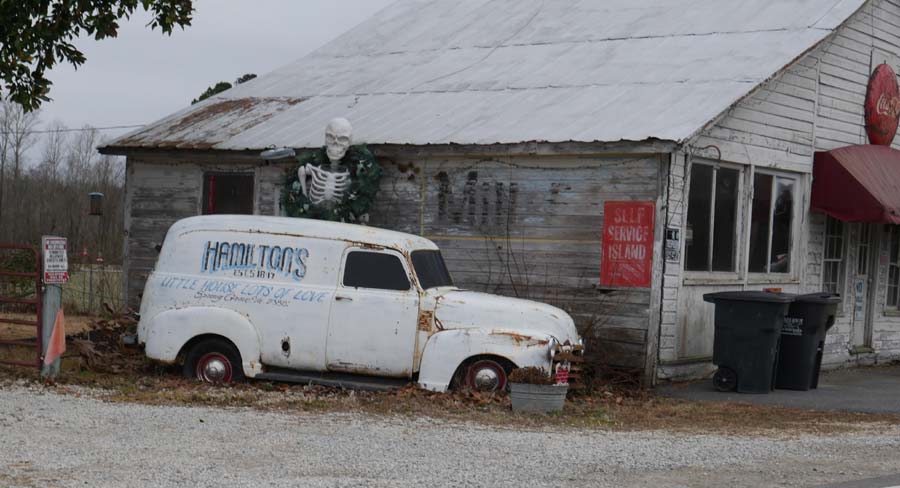
This panel truck was next to an old building on Route 10 on the Polar Bear Run
FTC Imposes 5-Year Ban on GM Disclosing Geolocation, Driver Data to Consumer Reporting Agencies
From The Epoch Times
The company must now obtain ‘affirmative express consent’ from customers before collecting their data.
The Federal Trade Commission (FTC) has finalized an order banning General Motors (GM) from disclosing consumers’ geolocation and driver behavior data to consumer reporting agencies for a period of five years, the agency said in a Jan. 14 statement.
The FTC had filed a complaint against GM and its subsidiary OnStar LLC in January 2025. GM “collected, used, and sold drivers’ precise geolocation data and driving behavior information from millions of vehicles—data that can be used to set insurance rates—without adequately notifying consumers and obtaining their affirmative consent,” the agency said at the time.
GM was encouraging customers to sign up for its OnStar connected vehicle service and the OnStar Smart Driver feature through a “misleading enrollment process,” the FTC said at the time.
During enrollment, the company did not “clearly disclose” that collected information—including data regarding speeding, late-night driving, and instances of hard braking—would be sold to third parties such as consumer reporting agencies, the commission said.
This information was used by reporting agencies to compile credit reports that were subsequently utilized by insurance companies to set rates and deny insurance, the commission said. The FTC said that tracking and collecting geolocation data was an invasion of privacy.
The five-year ban is part of the FTC’s settlement order with GM. The ban is appropriate “given GM’s egregious betrayal of consumers’ trust,” the FTC statement said. The order was issued against OnStar LLC, General Motors LLC, and General Motors Holdings LLC, which are all owned by the General Motors Company.
In addition, for the next 20 years of the order, GM is required to obtain “affirmative express consent from consumers prior to collecting, using, or sharing connected vehicle data” except under certain circumstances, such as providing location data to emergency first responders, the FTC said.
During that period, GM must ensure that U.S. customers can request a copy of their data, ask for their data to be deleted, and opt out of geolocation and driver behavior data collection.
“The Federal Trade Commission has formally approved the agreement reached last year with General Motors to address concerns,” a GM spokesperson told The Epoch Times on Jan. 15.
“As vehicle connectivity becomes increasingly integral to the driving experience, GM remains committed to protecting customer privacy, maintaining trust, and ensuring customers have a clear understanding of our practices.”
In a statement on Jan. 16, 2025, GM said that although Smart Driver was created to promote safer driving among users, the company ended the program following customer feedback.
“Last year, we discontinued Smart Driver across all GM vehicles, unenrolled all customers, and ended our third-party telematics relationships with LexisNexis and Verisk,” GM said at the time.
“The FTC consent order includes new measures that go above and beyond existing law, while capturing steps we’ve already taken to establish choices for customer data collection and communications about how the information is used.”
GM had affirmed that it would obtain customer consent before collecting, using, or disclosing certain types of connected vehicle data, in line with its agreement with the FTC.
Vehicle Data Collection
Multiple other car companies admit to collecting driver data as part of their privacy policies.
For instance, Honda gathers geolocation and driver behavior data, according to its data privacy practices webpage.
Driver behavior information includes “vehicle speed, vehicle acceleration and deceleration, pedal positions, engine speed, direction and time of travel, steering angle, yaw rate, vehicle control, and Honda Sensing or Acura Watch system settings and usage,” it said.
In a Jan. 6 statement, Toyota said it collects a vehicle’s precise location, within 1,850 feet. The company clarified that it does not use the location or driving data for marketing purposes or offer it to third parties.
Kia’s privacy policy states that the company collects geolocation data and other vehicle information that could be shared with third parties for purposes such as crash notification assistance, content-based services, roadside assistance, and determining driving score and usage-based insurance.
In April, Sen. Elissa Slotkin (D-Mich.) introduced the Connected Vehicle National Security Review Act, which would allow the Department of Commerce to ban or restrict connected vehicles or components coming from China or other nations of concern if deemed to pose a threat to national security, according to an April 10, 2025, statement from the lawmaker’s office.
“Chinese vehicles, which are dirt cheap thanks to state subsidies, could collect full motion video of sensitive sites, 3-D mapping, and geolocation of individual drivers—all of which could be sent back to Beijing,” Slotkin said.
The bill was referred to the Committee on Banking, Housing, and Urban Affairs in June 2025.
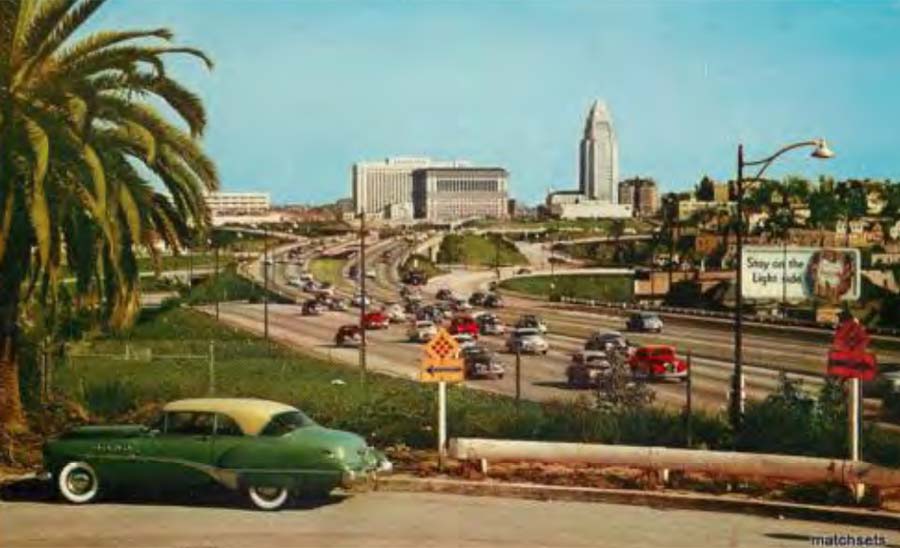
The year 1953 calendar dates match 2026. This is the Los Angeles Civic Center in 1953.
The Briefs
China’s BYD has overtaken Tesla as the world’s top electric vehicle seller. Elon Musk’s Austin-based company yesterday reported selling 1.64 million EVs last year, roughly 9% fewer than in 2024. BYD, meanwhile, delivered approximately 2.26 million EVs in 2025, a nearly 28% year-over-year increase.
BYD, which began as a rechargeable battery manufacturer in the 1990s, surpassed Volkswagen as China’s bestselling car brand in 2023. The Shenzhen-based automaker has recently expanded its sales outside China as well; the UK is its largest international market, with year-over-year sales surging 880% in September. Tariffs exceeding 100% effectively bar BYD cars from the US, where overall EV sales in November fell over 40% from a year earlier. Tesla, which remains America’s largest EV maker, reported a 16% year-over-year decline in fourth-quarter sales.
The US sales slowdown follows the Sept. 30 expiration of federal EV tax credits. Tesla's third-quarter sales rose 29% from the prior quarter as consumers rushed to beat the deadline. Tesla shares fell 2.6% yesterday, after rising 18.6% in 2025.
General Motors Co. reports 5.5% annual sales gain in 2025, retaining position as America's largest vehicle seller; Stellantis' Jeep brand posts first annual sales gain since 2018. General Motors to record $7.1B hit in Q4 2025 following its restructuring in China and decision to pull back from EV efforts amid weakening demand.
Ford Motor reports US sales in 2025 increased 6% amid demand for hybrids and lower-priced trucks that helped counter a sharp slowdown in electric-vehicle sales, marking the automaker's best annual sales since 2019.
About 17% of Virginians had driven high one or more times in the last month. That’s according to a survey the Virginia Cannabis Control Authority conducted in 2024.
As Virginia’s legislature could vote to legalize and establish a retail marijuana market this year, authorities are concerned about the tracking and prevalence of drug-impaired driving.
Though the harmful effects of alcohol on driving are well-documented, researchers found that collecting data on the impacts of drugs, including cannabis, on driving, has a long way to go.
According to a new report from the Department of Motor Vehicles and Virginia Tech Transportation Institute, that’s in part because unlike for alcohol, there is not a standardized metric for drug impairment.
From 1925: “Horse-drawn vehicles are fast disappearing from our streets, but jackass-driven automobiles will still be with us 100 years from now.”

A blue stop sign is a blue and white octagonal sign that indicates you should make a full and complete stop before driving again. It functions just like a red one - it just happens to be blue.
The difference between blue stop signs and red stop signs comes down to where they can legally be installed and where in the country you’re most likely to spot them. Blue stop signs are installed on private property. Think: ranches, golf courses, large estates and other private lands that have roads that need traffic control. Because official stop signs must be red with white letters, you won’t see blue stop signs at public intersections.
Police in New Castle, Delaware, received a call on Dec. 10 from Kayonne Baxter, 21, who wanted to retrieve some items from a Hyundai Sonata that had been towed, Fox29-TV reported. Oh, and he had stolen the car the day before. Baxter was taken into custody on the same street where the Hyundai had been stolen; he was charged with felony theft of a motor vehicle.
Diane Huff-Medina of Lakewood, California, didn't even realize her pet cat, Piper, was gone until she looked at her doorbell camera video, KTLA-TV reported. On Dec. 11, an Amazon Flex driver delivered a package to Huff-Medina's front door, then stooped over to pet Piper, who was sitting on the porch. Then the man picked up Piper by her scruff and carried her off to his vehicle. An Amazon spokesperson called the act "horrible" and said the delivery person is no longer "eligible to deliver to our customers." Police said the driver had been identified and charges are pending -- but Piper is still missing. "I don't know where she is or if she's OK," Huff-Medina said.
After denying requests for a number of vanity license plates on the grounds that the requested tags were obscene or inflammatory, Illinois Secretary of State Alexi Giannoulias created a YouTube video in which he read off some of his favorites, including "IBPOOPN," "SNDNUDZ," "BDASMOM" and "ICUP." WBEZ Chicago reported that while Giannoulias and his staff appreciate the creativity of the state's drivers, he advises them to "keep it clean and avoid ending up on the naughty list."
A 38-year-old man was arrested on Dec. 20 in Aukland, New Zealand, for checking all of the wrong boxes, 1News TVNZ reported. Using flashing lights on the roof of his station wagon to pull over other motorists? Check. Attempting to pull over an unmarked police car? Check. Fleeing the scene upon realizing his huge mistake? Check. And finally, failing a breath test once the police caught up with him? Check. The impaired impersonator's breath analysis registered at twice the legal limit, adding a charge of excess breath alcohol to the already serious charge of impersonating a police officer. "It's bad enough that this person thought it was okay to impersonate a police car," Inspector Kerry Watson said. "It's even worse to see impaired and dangerous driving."
The Florida Man who sought to engineer a supposed chance run-in with a woman by hiding a GPS tracker on her car has copped a plea deal, records show.
In a court hearing yesterday, Tyler Strack, 23, pleaded no contest to installing the device on the 22-year-old victim’s vehicle while it was parked outside her residence in Safety Harbor, a Tampa Bay-area city.
Strack was initially charged with a felony, but he pleaded yesterday to a reduced misdemeanor charge. He was ordered to pay fines and court costs totaling around $700, a portion of which he could reduce by performing community service at a rate of $14 an hour.
At the time of Strack’s arrest last year, the victim told police that she had “a brief sexual relationship” with him “several years ago which ended with no further substantial contact.”
In an apparent effort to rekindle that passing fling, Strack bought a Cube brand tracker from Best Buy and placed the device on the woman’s car. But the victim discovered the item and contacted police, who then used subpoenas to connect Strack to the Cube purchase.
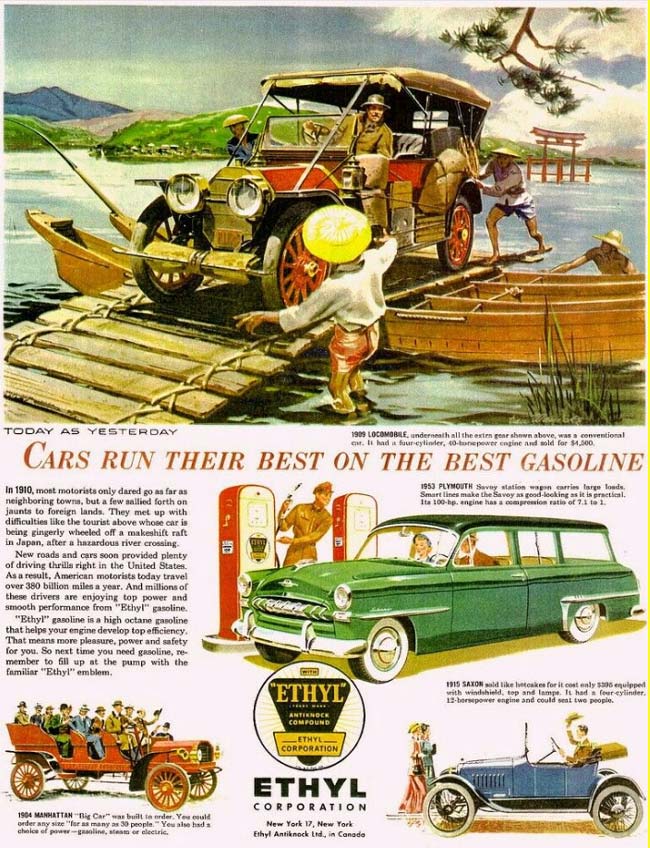
Ethyl ad from 1953
Tired of your “blah” life? Seeking some “excitement”?
Well, an Iowa man in that exact position recently sought to shake off the blues by exposing himself to cars passing by on two separate interstates, police charge. Twice last month, cops say, Danan Ary, 30, stood against the rear of his 2012 Chevrolet Impala “with his pants and underwear removed to his ankles and shirt lifted to casually expose his genitals and abdomen to oncoming traffic” in suburban Iowa City.
When questioned by police, Ary reportedly confessed to his indecent exposures. According to criminal complaints, Ary explained that “this behavior was fulfilling as ‘excitement’ that was currently missing in his ‘blah’ life.”
Investigators say that Ary “knew this behavior to be inappropriate and unacceptable as well as offensive to others within view.”
Ary, who has a lengthy rap sheet, was arrested Wednesday on two indecent exposure counts. Ary, who was being held in the Johnson County jail in lieu of $5000 bond, was transferred today into the custody of state prison officials, apparently for violating probation terms stemming from a prior felony conviction.
The FBI is on the case of a $400,000 shipment of lobsters that has gone missing, Boston.com reported on Dec. 30. The truck and its valuable cargo disappeared somewhere between its departure point at a warehouse in Taunton, Massachusetts, and its destinations at Costco stores in Illinois and Minnesota. "It followed a pattern we’re seeing more and more," said Dylan Rexing, president and CEO of Rexing Companies, "where criminals impersonate legitimate carriers using spoofed emails and burner phones to hijack high-value freight while it’s in transit." U.S. Customs and Immigration Enforcement estimates that the U.S. economy loses $15-35 billion annually to cargo theft, with high-value items like pharmaceuticals, electronics and alcohol among the most frequent targets.
A man was hit by a tractor-trailer while attempting to cross I-95 on a bicycle Monday afternoon, according to Virginia State Police.
The crash occurred around 4 p.m. in the southbound lanes near the 82-mile marker, which is near Chamberlayne Road. According to witnesses, the driver of a red bobtail tractor with a flatbed braked abruptly before striking the bicyclist. The driver then fled the scene.
The man was taken to VCU Medical Center with serious injuries.
The suspect tractor-trailer is expected to have damage to its left side, per VSP.
Anyone who witnessed the crash or has information related to the incident or the suspect vehicle can contact Virginia State Police at 804-750-8758.
In a reversal from previous years’ pollution reductions, the United States spewed 2.4% more heat-trapping gases from the burning of fossil fuels in 2025 than in the year before, researchers calculated in a study released Tuesday.
The increase in greenhouse gas emissions is attributable to a combination of a cool winter, the explosive growth of data centers and cryptocurrency mining and higher natural gas prices, according to the Rhodium Group, an independent research firm. Environmental policy rollbacks by President Donald Trump’s administration were not significant factors in the increase because they were only put in place this year, the study authors said. Heat-trapping gases from the burning of coal, oil and natural gas are the major cause of worsening global warming, scientists say.
An 11-year-old boy was behind the wheel of a stolen vehicle during a police pursuit in Newburgh Heights Ohio.
Newburgh Heights police said the car was reported stolen out of Parma. Officers located it on Saturday and attempted to stop it, but the driver continued west on Harvard Avenue and crossed over the Denison Bridge before crashing a short time later on Denison Avenue. The vehicle struck a residence, causing minor damage. No one was hurt in the incident. Police said three children were inside the vehicle, ages 12, 11, and 8. The 11-year-old was driving. After the crash, the children tried to run but were quickly caught. Investigators said the children told officers they learned to steal cars by watching online videos.
The boys were released to their parents, and police said they plan to file charges in juvenile court.
F1 Drivers Race Oldest To Newest Cars
Repair Mistakes & Blunders
From Rock Auto
I once had a '73 Ford Pinto with a blown exhaust pipe flange gasket. I jacked the car up and set it down on a couple stacks of concrete blocks, one supporting each side of the engine subframe. The blocks were about a foot apart inside edge to inside edge. To get the leverage required to bust free the rusted on nuts, I had to crawl beneath the car with my head between the blocks. I had a 6-point deep socket on a swivel adapter on the end of a 24" extension with a breaker bar.
When the nut broke loose, the socket twisted over and came off the extension. I watched in slow motion as the socket came falling straight down for my face. Quickly I turned my head to the left to prevent the socket from impacting my face. My face hit the concrete block on the left. Instinctively I then whipped my head to the right and smacked the concrete block on that side even harder. About that time the socket hit me right in the middle of my forehead with a resounding "Thunk!"
I laid there a while and laughed at my own stupidity.
Ed in Florida
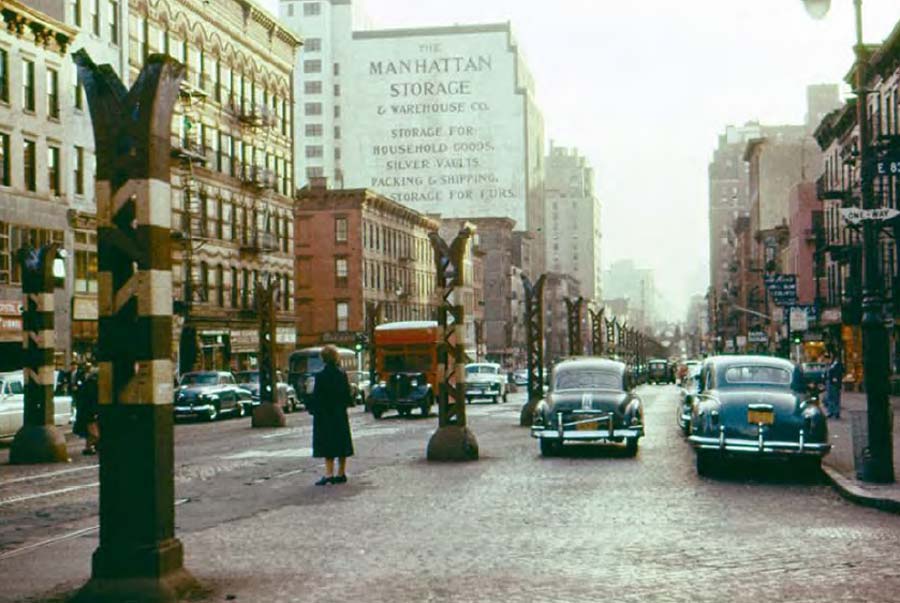
Newark New Jersey 1953
A remote stretch of desert interstate could become ‘America’s autobahn’
From Straight Arrow News
Americans love driving fast cars fast. It’s the mystique of white-knuckling a sports car to its limit that made the German autobahn and Paul Walker famous.
An Arizona lawmaker wants to give drivers the green light to drive as fast as they deem “reasonable and prudent” on some of the state’s long, straight stretches of paved road, saying the lack of a speed limit will actually reduce deadly crashes. A traffic safety advocate said the bill invites catastrophic wrecks that could lead to higher insurance premiums for the state’s slowpokes.
State Rep. Nick Kupper, R-Surprise, joined fellow lawmakers at the Capitol this week for the opening days of the state’s legislative session. He’ll be pushing for his Reasonable And Prudent Interstate Driving, or RAPID, Act. If successful, it could lead to the removal of daytime speed limits on a number of interstate highways across Arizona.
“I’ve spent a decent amount of time in Germany with the military, driving up and down the autobahn and know how it works,” Kupper told Straight Arrow News. “We need to have an honest-to-God pilot program in our nation because there are so many empty, flat, great, well-taken care of Western roads in this country that there’s no reason to have a set limit.”
The bill, if enacted, would start with a pilot program along a sparsely populated stretch of Interstate 8 that lies west of the Valley metropolitan area and along the southern edge of Kupper’s district. After gathering data, the state’s Department of Transportation could give drivers on other qualifying highways the chance to burn rubber.
The bill would also enhance fines for left-lane lingering motorists that pose a safety threat should a Corvette ZR1 approach from behind. HB 2059 would issue $500 tickets to drivers hanging out in the left lane when not passing a slower driver for the first offense and $1,000 for the second time in the same year.
Yellow flag
Rick Murray, president of the National Safety Council’s Arizona chapter, pointed to decades of data showing higher speeds lead to more frequent and severe crashes and fatalities.
“A study of 25 years of speed limit increases found that a mere 5 mph increase in the limit resulted in an 8% increase in fatality rates on those roads,” he told SAN. “Arizona is already one of the deadliest states to drive in.”
An analysis of 2024 U.S. Department of Transportation data shows Arizona is fifth-deadliest state in terms of roadway fatalities.
Murray said the proposed bill represents a “dangerous departure from proven traffic safety standards” and predicted more people would die on Arizona highways if this bill is enacted.
Not the first state with the need for speed
Montana and Nevada were the first states to formally open some of their highway speed limits. The states carried the same “reasonable and prudent” standard on many of their roadways from 1955 until President Richard Nixon signed the Emergency Energy Highway Conservation Act in 1974, which blanketed the country in a 55 mph speed limit and cut federal funding to states that didn’t enforce it.
Only Montana reverted back to its high-speed ways in 1995 when former President Bill Clinton signed legislation repealing Nixon’s law. But the “Montanabahn” didn’t last. The state’s Supreme Court ruled the speed suggestion unconstitutional after a 1998 lawsuit from a driver ticketed for driving 85 mph said the ambiguity of a non-speed limit didn’t afford drivers due process. A 75-mph speed limit was posted in 1999 — the same limit posted on Arizona’s rural highways.
Arizona’s constitution doesn’t have the same provision requiring specificity that struck down Montana’s speed-limit-free roads.
Kupper dove into Montana’s traffic data from the years without a speed limit and found evidence that the lack of a clear speed limit had actually lowered traffic fatality metrics there.
“In a derestricted zone, their vehicle fatality rate per vehicle-mile traveled was actually lower than it was when they didn’t,” Kupper said. “If it’s safer, you get the combination of freedom and safety.”
Absent a speed limit, Kupper said most drivers cruise along between 75 and 80 mph.
Insurance costs
Arizonans pay an average of $2,644 a year for full-coverage automotive insurance, according to Bankrate. That cost is 2% less than the national average, and much less than the state’s neighbors to the west, California and Nevada. Murray said any legislation that pulls speed limits from roads would likely send that cost higher.
“Whenever claims go up, insurance goes up,” Murray said. “So it’s likely we will see even higher premiums in the future if this passes.”
While Arizona drivers are known for being notoriously aggressive, Cars.com lists the state’s average top speed on rural interstate roads as 68 miles per hour. More than a dozen states have higher average speeds.
The RAPID Act was first read in the House on Monday and assigned to the House Transportation and Infrastructure Committee.
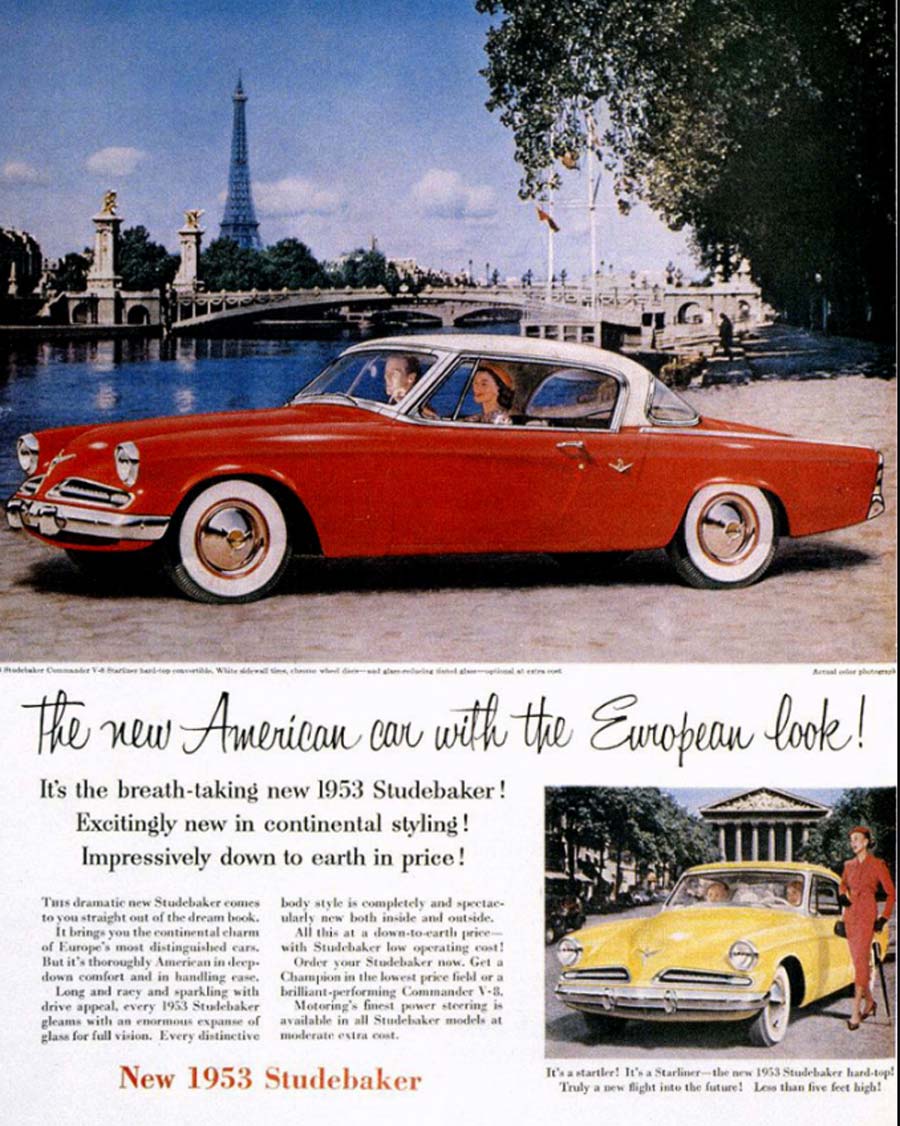
The all new 1953 Studebaker
How legal dispute led one man to collect a record-breaking amount of traffic cones
From: Guinness World Records
A UK man owns a very unusual collection that’s held a world record for more than 25 years.
David Morgan and his largest collection of traffic cones have long been the talk of the town!
When we verified his record in 2000, he had 137 cones, so it’s possible he has loads more now.
In 2007, there were reports that his collection had already grown to 500 and it’s been said he had about two thirds of all types of traffic cones that had ever been made.
But what sparked this unique love of traffic cones?
Well, he once told the Oxford Mail: “It's really interesting. There are so many different shapes, sizes and colours. And the models are always changing."
David, who worked for a plastics company that produced traffic cones, explained he started his collection in 1986 while he was involved in a legal dispute with a rival manufacturer.
They were arguing over the design of a cone and to prove his case, David scoured the country for different types of traffic cones so the designs could be compared. He won the case.
He added to the publication: "A competitor wanted to take us to court because they said we had copied their design. So I started collecting cones - and I haven't been able to stop.
"I'll find out where the roadworks are and go and look for them. But the best ones are from more unusual places, like village halls and from undertakers - who always have different ones, and look after them.”
He said he couldn’t resist collecting cones everywhere he went, but that he’d never just steal a cone because it was there as a safety measure – instead, he’d speak with the foreman on the site or swap it with another cone from his collection.
David’s collection is made up of cones from around the world, having even picked one up from the airport while he was on his honeymoon in Corsica in 1988.

Before we verified the record, a letter about the collection was sent to us by journalist Claire Pillinger, who had seen it with her own eyes and was sure it must be record-breaking.
She wrote: “He believes he is the only collector… and I can understand why! People truly gawp when they see them all on his lawn.
“It is truly amazing. I never realized there were so many. He has hundreds more but these are the different ones. He says, as there are only predominantly now five manufacturers left, he has about two thirds of all those ever made.”
At the time, David would often display his collection out in the garden, but did admit they made mowing the lawn rather difficult.
Stop Making Complicated Excuses For EVs Failing in America When The Simple Reasons Are They Are a Hassle, and Public Charging Does Not Live Up To Its Promises
From Torque News
A veteran Chevy Bolt owner recently tried to charge the car at America’s very best DC charging network and had difficulty doing so. After asking for help, it took literally hundreds of comments to sort this mess out.
Sure, discount me as an EV hater if you like, but I’m the guy who’s driven virtually every EV made, listed their positives in glowing reviews, and has four EV chargers in my garage. I’m not a Luddite or in the pocket of Big Oil; I’m a former engineer and business manager from Fortune 500 instrumentation and healthcare equipment companies who started testing cars and EV chargers fifteen years ago. So when I spot a Facebook post by a veteran EV owner that says they couldn’t charge their car, my ears perk up. Why? What was the problem this time? I want to know why, in 2026, after 30 years of modern EVs we still can’t charge the silly things.
Sadly, many people act online as if charging an EV is super easy. It is not. There are four different EV charging handles in use right now in America. No single EV can use all four. Some of the highest-rated plug-in cars can’t charge at all on DC chargers, roughly a quarter can’t charge on the nation’s best DC charger network, and that very network has some locations that will charge certain brands and not others. To call it a mess is an insult to messes.
This story was inspired by Chevy Bolt owner R.U., who is a frequent poster at one of the better Chevy Bolt Facebook fan clubs. This person has owned the car for a long time and posts frequently about living the electric life. They are a Top Contributor in the club. Let’s look at one of two recent posts by this veteran EV owner:
This DC charging station says it can charge up to 350 kW speed, but the highest I have seen is 32kW on my Bolt, starting from 40% and up. Why? Where is my advertised 55kW?
Now, if you are a savvy EV driver, like I am, you already know about the five most common reasons why the charger is not delivering its promised rating, starting with the fact that its capability is an imaginary top speed in this case, since the car limits charging to the best possible rate of 55 kW. We got it. R.U. is not dumb and knows that too. What R.U. is actually asking is a question I have asked in multiple stories and have suffered being called an idiot and “Big Oil Shill” in the comments section. R.U. wants to know why, when charging at just 40%SOC, the car won’t accept charge at its advertised speed of 55 kW. I think the question is more than fair. I also know about a dozen reasons why the car doesn't do what it promises. Cold weather, shared charger, full moon, bad juju, even numbered day, odd numbered day, day ending in Y, heck, there is such a long list of reasons why a car won't charge as quickly as promised on a DC charger it sort of makes you wonder why automakers and EV advocates overstated the actual speed. Does it seem like false advertising to you?
Just a few of the 114 suggested reasons fellow EV owners offered include these, and we will make our own note after each:
1) “Next time, start charging at 10%, and you might see 50kW for a brief moment.” Here we see that a fellow Bolt owner is ready to concede 10% of their charging speed without even thinking about it as a sacrifice. And why just for a brief moment?
2) “Is it cold there? Also, starting at 40% probably isn't quite low enough to see max speeds.” Here is one comment that pulls in two reasons owners are ready to accept low charging speed without wondering why they don't deserve the full speed that is advertised.”
3) "Below 50°F? Are other cars nearby being charged? More than one car is being charged? Some stations just stink (profanity edit)?" Here, a fellow owner quickly rattles off four reasons why DC charging is not all it’s cracked up to be.
Unfortunately, I feel I must also include comments that effectively call this EV owner stupid for posting a question about charging in the first place. Sadly, this type of attitude is not uncommon in EV clubs. There are those who are so radical in their EV fanaticism that they think any issue is the fault of the person not smart enough to own one. Here’s a couple to illustrate the group of nasty EV owners:
1) “It's not a machine problem, it's a human problem.” The implication here is that an EV owner whose EV charges dramatically slower than advertised is the problem. Sad.
2) “Unless it’s the only option, a Bolt should never plug in at a 350kW. You’re just being rude to cars that can actually charge.” This is simply elitism. Since R.U. owns an affordable EV, they should just avoid DC chargers to let the rich folks have them. Terrible.
3) “If you want high-speed charging, get a proper EV vehicle.” Again, elitism. Car Talk named the Bolt the best overall EV three years in a row. The Bolt has won endless awards. R.U. is only asking for what R.U. was promised would be the charging speed. Should EV owners settle for being sold a fantasy?
4) “Time to start learning the issues of charging speed.” This comment may not be intended as nasty, but it is one owner calling another veteran owner dumb. Plain and simple.
Slow charging is not the only problem veteran electric vehicle owner and operator, R.U., has struggled with. In a post from last month, R.U. explained that they could not get a DC charger to work AT ALL. To charge, R.U. needed to move to a different charger, which was luckily unoccupied. Here’s what R.U. posted:
Trying to charge at the Electric Vehicle Institute, and service was interrupted - twice.
Fellow owners offered sympathy and asked for updates as to the resolution, which R.U. did offer. Here is one comment that we think sums up what many EV owners might say when they see a post about not being able to charge: “I’ve had the same issue happen.”
R.U. is not a Debby Downer poster in this club. Many of the posts offered by this owner are entirely positive and also informative. One starts, “Just discovered this cool feature.” Another is titled, “Just found this station yesterday as well and appreciated the experience!”
So, What’s Our Point?
Stepping back from the details of this veteran owner’s posts about having difficulty charging an award-winning, very popular electric vehicle, we want to offer our analysis on EVs and why they are not succeeding the way many advocates hoped.
A) New car shoppers are not stupid. They understand EVs have upsides like great torque, quiet operation, and that they offer a mode of transport with no local emissions. However, those are not priorities for about 94% of American shoppers. They value other things. Reliability. Usability. Predictability. Affordability. They just want to get to work, pick the kids up after work, and go out on the weekends without vehicle hassles. As R.U. clearly illustrates, even veteran owners driving award-winning EVs are hassled by them.
B) EVs positives are over-hyped, and many promises are not kept. Slapping the words “Ultra Fast Charging" on the side of a box that either will not charge at all or charges your award-winning EV at literally a tenth of that speed does not go unnoticed. People talk. Like R.U. here. People say, “What else isn’t true about owning this type of car?”
C) Declining EV adoption is not due to complex factors. Every EV publication pumps out story after story every day along the lines of "This big breakthrough COULD be what we have all been waiting for.” Why are we still waiting exactly? It’s been 30 years since the GM EV-1 and four generations of subsequent EVs.
GM’s not the only brand with a long history of EV development. Toyota had battery-electric RAV4s running around California six years before Tesla was incorporated, and the top-selling green vehicle brand in America is now on its fourth generation of American-market EVs. Tesla has also had four EV generations. Ford has seen EV trucks come and go already.
D) The time to work out the bugs on EVs was twenty years ago, not next year. American shoppers are eagerly gobbling up hybrids from brands like Toyota, Lexus, Ford, Hyundai, and Kia because they are green vehicles that offer significantly reduced carbon footprints without the hassles and false promises of EVs. That’s why, heading into 2026, EVs are being skipped over by 94% of new car shoppers.
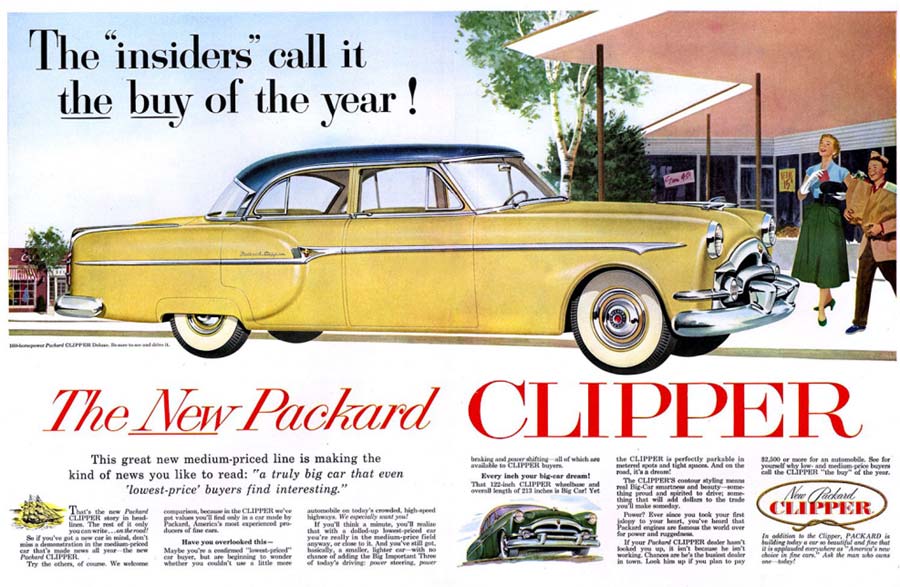
1953 Packard Clipper
Guy Fieri Recently Showed Off His Extraordinary Car Collection
From SupercarBlondie
Guy Fieri’s car collection will blow you away with over 20 vintage beauties
The collection is an ‘art’ rather than a showpiece
Fieri’s collection is rounded off with his own Fire truck after a past disaster
Celebrity restaurateur Guy Fieri is no stranger to getting a bit of cooking oil splashed up his apron, but engine grease is a close second as he proves to be quite the petrolhead with an incredible car collection.
Fieri spends a lot of time behind the camera now, and in a recent tour of his property, he dropped the garage door down on his car collection.
It’s safe to say, Guy Fieri is a car guy.
The fabled American TV personality showed off his home and his prized ‘art’ collection which ranged from Cadillacs and Impalas to Limos and behemoth trucks.
As celebrities‘ car collections go, many opt for the luxury route, flooding mansions with Bugattis and Lambos.
But there’s often something disingenuous about the personality that they give off. – flashy over substance.
Not Guy Fieri.
In a recent property tour with YouTube personality Graham Bensigner, the famed foodie revealed that he’s got a deep love for the ‘art’ of vintage cars.
The tour took Bensinger around Fieri’s stunning barn, which features a period-specific 1800s bar with his own signature Tequila brand – a collaboration with Sammy Hagar – and a regulation three-pointer basketball half-court on the ground floor cornucopia.
But over in his garage, Fieri has over 15 vintage cars lined up on a two-story shelf.
A 1971 Chevrolet Chevelle, a 1968 Pontiac Firebird, a 1976 Jeep CJ-5, a 1969 Chevrolet Impala SS, a 1967 Chevrolet C10 pickup, and a 1941 Cadillac Limo all stood in mint condition.
He also owns the first yellow Camaro convertible that Chevrolet ever made.
Then there is another collection over by the house – yes, the barn is his glorified man cave.
In a second garage, another stunning eight cars stood guard to his gym.
A proud 1934 Buick Phantom rounded off the collection.
But wait, there’s more.
Fieri also owns a massive 800HP Apocalypse 6×6 truck alongside his own Fire Truck to protect the very combustible wooden buildings, and a rescue truck primed with a kitchen and WiFi.
Of course, there are some more recent supercars in the collection, such as an Aston Martin.
For the most part though, it’s rustic power vehicles over speed and flash.
Comparing his collection of cars to an art form, Guy Fieri defended his collection, which serves as a hobby and passion rather than a showpiece, even if he seldom gets behind the wheel of them all.
He said: “My Dad said to me once, you put so much money into these cars.
“Why? You don’t drive them.
“Does anybody walk into their parlor and rip a Van Gogh off the wall and walk it around town? This is my art.
“There’s something that I appreciate about each of these cars – about what it took to get them, how long they took, or what the story is behind it. They all have a little piece of history.”
Still, every car in the collection gets full-time care and at least one monthly venture outside of the garage, even if it’s not always Fieri himself putting his foot to the pedal.
Guy Fieri’s car collection really is a thing of beauty.
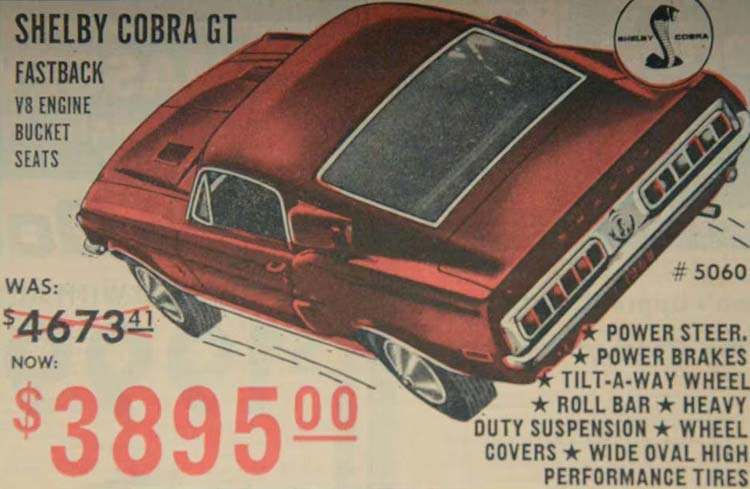
Jackpot! Ram TRX Returns for 2027 with 777 Horsepower
From Hagerty
The Ram TRX is back! We’re gonna spare you from the Jurassic Park puns we had, and trust us, there were a lot of them. The important part is that the supercharged TRX is back from the brink, and it’s more powerful than ever before. Its 6.2-liter supercharged Hemi V-8 now produces 777 hp at the engine’s 6500-rpm redline. That’s a 75-horse increase over the last iteration of the TRX that Ram built from 2021-2024. Peak torque is also up, this time by 30 lb-ft, with a peak of 680 lb-ft at 4800rpm, making for a wide powerband that the quick-shifting eight-speed automatic has to work with. That’s enough of a boost for the 2027 Ram TRX to retake the title of most powerful gasoline pickup truck, with a claimed zero-to-60 in just 3.5 seconds.
“We started 2025 with a simple rallying cry—three words and three letters: The Last Tenth and LFG,” said Tim Kuniskis, Head of American Brands, SRT Performance, North American Marketing and Retail Strategy. “Our first moves were clear: revive the legendary Hemi V-8 and reignite the SRT Performance Division. So, would anyone really bet against TRX making a comeback?”

“But bringing back the nameplate isn’t enough. Ram set the bar five years ago with 702 horsepower, and that benchmark has been challenged. SRT doesn’t limbo; we high-jump—and 721 wasn’t going to cut it. 777 horsepower? That’s the mark. And it represents more than power—it signals an awakening and a new path forward,” said Kuniskis.
Clearly, Ram is punching back against the supercharged V-8 Raptor R, referencing the 721hp it would take to reclaim the gasoline horsepower war from the 720-hp off-road F-150. Ford has had a serious horsepower edge in this fight since the 540-hp RHO and its turbocharged six-cylinder took over the role of top off-road Ram when the Hemi was put out to pasture. We weren’t offered many details on how Ram was able to squeeze so much extra power from the Hemi, although there was talk about a new intake routing and a new tune. Our first guess at the bump in power was proven wrong, however, as the TRX still uses a 2.4-liter supercharger, as opposed to the 2.7-liter unit from the Challenger and Charger Redeye that pushed the Hemi to 797 hp in those applications. Along with the serious bump in power, there’s more news. The price for the TRX, which is still well-equipped and luxurious, now starts at $102,590. That’s nothing to sneeze at, but the “Final Edition” TRX that was supposed to mark the last call for the supercharged Hemi Ram was priced at $119,620.
Every 2027 Ram TRX will come with electronic locking differentials front and rear, built to take the punishment dished out by the supercharged Hemi V-8. Those diffs are linked to a full-time transfer case that offers four-wheel-drive auto, four-wheel-drive high (locked), and a 2.64:1 four-wheel drive low range (locked). The rear suspension on the TRX utilizes mounting locations that are not shared with the standard Ram 1500, providing it with 14 inches of wheel travel on its full-floating Dana 60. That rear axle also uses its own unique damper to reduce wheel hop. Up front, forged aluminum upper and lower control arms deliver 13 inches of travel.
The driver can tailor the suspension for specific driving conditions using the standard Bilstein Black Hawk e2 adaptive performance shocks, which are connected to Ram’s Active Terrain Dynamics suspension management system to ensure that traction control, throttle response, and the shocks’ compression and rebound tuning work in harmony. Each corner is fitted with a 15-inch brake rotor to help tame the beast.
The Bloodshot Night Edition, a new appearance package available for the 2027 Ram TRX, adds Flame Red splash graphics down the flanks as well as a center stripe to an otherwise black exterior. Inside, the TRX badging features red accents, and so does the carbon fiber interior trim. You’ll be able to order your own 2027 Ram TRX soon, and they’ll arrive in the second half of 2026.

US Treasury Implementing Trump-Backed ‘No Tax’ on Car Loan Interest, Bessent Says
From The Epoch Times
The guidance said that new vehicles eligible for the tax deduction include those with final assembly in the United States.
The Treasury Department is implementing a policy that eliminates taxes on car loan interest, a move meant to lower costs, Treasury Secretary Scott Bessent said on Jan. 7.
The policy, which the secretary called “No Tax on American Car Loan Interest,” is being implemented under the Trump administration-backed One Big Beautiful Bill Act, signed into law last summer.
The tax cut will be “putting money back in the pockets of working and middle-class families,” Bessent wrote in a statement on X.
“For new U.S.-assembled vehicles purchased in 2025–2028, eligible taxpayers can deduct up to $10,000 per year in auto loan interest, whether they itemize or take the standard deduction.”
“This deduction helps lower monthly costs and makes car ownership more affordable when families need it most,” he said.
“The tax cut also supports American workers by applying solely to U.S.-assembled vehicles, strengthening domestic manufacturing.”
On the last day of 2025, the Internal Revenue Service (IRS) announced it is providing guidance on how to handle the new interest deduction for car loans under the bill, stating that the deduction applies to vehicle loans entered into after Dec. 31, 2024. The tax break allows for up to $10,000 on car loan interest, the IRS said.
The guidance said that new vehicles eligible for the tax deduction include those with final assembly in the United States, according to the IRS, and that the car must be for personal use and not for commercial or business purposes.
The IRS has not yet released a list of vehicles and models that may qualify under the program.
The announcement on Wednesday comes as the Trump administration has sought to pivot to a more economy-related message ahead of the November 2026 midterm elections, which could determine which party controls the House and Senate.
Since last November, President Donald Trump and Bessent have sought to highlight the White House’s initiatives to reduce prices across a range of goods and services, such as gasoline and eggs.
Trump also announced that he would be banning large institutional investors from purchasing single-family houses, and that such a policy is needed to assist younger families in purchasing their first homes.
“People live in homes, not corporations,” Trump wrote in a Truth Social post as he called on Congress to codify the ban. He also said that due to high inflation, the “American Dream is increasingly out of reach for far too many people, especially younger Americans,” namely when they purchase their first homes.
Last month, Trump pledged in a prime-time address that he would roll out “some of the most aggressive housing reform plans in American history” in 2026, while administration officials such as Bessent have said that other tax breaks would start to go into effect this year that would provide more tax return funds to families.
In his post, Trump would discuss housing and affordability in more detail at the World Economic Forum in Davos, Switzerland, an event known for attracting CEOs, wealthy financiers, and academics.
My Funny Valentine
From Reader's Digest
“As Valentine’s Day approached, I tried to think of an unusual gift for my husband. When I discovered that his favourite red-plaid pants had a broken zipper, I thought I had the perfect Valentine. I had the pants repaired, and gift-wrapped them. On the package I put a huge red heart on which I printed: My Heart Pants for You. I was the surprised one, however, when I saw the same heart taped to our formerly empty, but now overflowing, wood box. On it he had written: Wood You Be My Valentine?” — Contributed by Mary Lou Pittman
“Driving through Southern California, I stopped at a roadside stand that sold fruit, vegetables and crafts. As I went to pay, I noticed the young woman behind the counter was painting a sign. ‘Why the new sign?’ I asked. ‘My boyfriend didn’t approve of the old one,’ she said. When I glanced at what hung above the counter, I understood. It declared: Local Honey Dates Nuts.” — Contributed by Theodore Bologna
“I met my husband while I was working in a science library. He came in every week to read the latest journals and eventually decided to take out the librarian instead of the books. After a year and a half of dating, he showed up at the library and started rummaging through my desk. I asked what he was looking for, but he didn’t answer. Finally he unearthed one of the rubber stamps I used to identify reference books. ‘Since I couldn’t find the right engagement ring,’ he said, ‘this will have to do,’ and he firmly stamped my hand. Across my knuckles, in capital letters, it read NOT FOR CIRCULATION.” — Contributed by Ruth E. Chodrow
“My boyfriend and I met online and we’d been dating for over a year. I introduced Hans to my uncle, who was fascinated by the fact that we met over the Internet. He asked Hans what kind of line he had used to pick me up. Ever the geek, Hans naively replied, ‘I just used a regular 56K modem.'” — Contributed by Anne McConnell
“The lingerie store where my aunt works was crowded with shoppers selecting Valentine’s Day gifts for their wives. A young businessman came to the register with a lacy black negligee. My aunt noticed that the next customer, an elderly farmer, was holding a long flannel nightgown and kept glancing at the younger man’s sexier choice. When it was his turn, the farmer placed the nightgown on the counter. ‘Would you have anything in black flannel?’ he asked.” — Contributed by Christine A. Pandolfo
“My husband, a certified public accountant, works 15-hour days for the first few months of the year. In spite of his hectic schedule, he took time out to order me flowers for Valentine’s Day. While pondering what sweet endearment to write on the card, he obviously began thinking of the many hours of work still ahead of him. His note read: ‘Roses are red, violets are blue. If I weren’t thinking of you, I’d probably be through.'” — Contributed by Cindy Wolf
“My friend Mark and I work in a lawn-mower-parts warehouse. Somehow Mark got the idea that his wife did not want a card on Valentine’s Day, but when he spoke to her on the phone he discovered she was expecting one. Not having time to buy a card on his way home, Mark was in a quandary. Then he looked at the lawn-mower trade magazines scattered around the office—and got an idea. Using scissors and glue, he created a card with pictures of mowers, next to which he wrote: ‘I lawn for you mower and mower each day.’ Mark’s wife loved it. The card immediately graced their refrigerator door.” — Contributed by Gene Hyde
“About a year had passed since my amicable divorce, and I decided it was time to start dating again. Unsure how to begin, I thought I’d scan the personals column of my local newspaper. I came across three men who seemed like they’d be promising candidates. A couple of days later, I was checking my answering machine and discovered a message from my ex-husband. ‘I was over visiting the kids yesterday,’ he said. ‘While I was there I happened to notice you had circled some ads in the paper. Don’t bother calling the guy in the second column. I can tell you right now it won’t work out. That guy is me.'” — Contributed by Pat Patel
“My high-school English teacher was well known for being a fair, but hard, grader. One day I received a B minus on a theme paper. In hopes of bettering my grade and in the spirit of the Valentine season, I sent her an extravagant heart-shaped box of chocolates with the pre-printed inscription: “BE MINE.” The following day, I received in return a Valentine from the teacher. It read: Thank you, but it’s still BE MINE-US.'” — Contributed by Brad Wilcox
“Every Valentine’s Day our campus newspaper has a section for student messages. Last year my roommate surprised his girlfriend with roses and dinner at a fancy restaurant. When they returned from their date, she leafed through the paper to see if he had written a note to her. Near the bottom of one page she found: ‘Bonnie, what are you looking here for? Aren’t dinner and flowers enough? Love, Scott.'” — Contributed by Richard B. Blackwell
“During World War II my parents had planned a romantic Valentine’s Day wedding. Suddenly my father, then stationed at Camp Edwards in Massachusetts, received orders to prepare to ship out, and all leaves were cancelled. Being a young man in love, he went AWOL. He and my mother were married four days earlier than originally planned and he returned to base to an angry sergeant. After hearing the explanation, the sergeant understandingly replied, ‘Okay, okay!’ Then, as an afterthought: ‘But don’t let it happen again!'” — Contributed by Sandra L. Caron

| Home Page | Show Photos | Calendar | Newsletter | Member Clubs |
| Info | Join Us | About This Site | Links | Contact |
© 1999 - 2026 Car Club Council of Central Virginia, Inc - All Rights Reserved
 Then there is the amendment to redistrict. Just 5 years ago the voters approved the Virginia Independent Redistricting Amendment that allows a non-partisan group to draw the districting lines. Now the Democrats want to dump that and have the General Assembly draw them up since the Democrats are in control. This special election will cost taxpayers $5 million. Here is what will be on the ballot on April 21: "Question: Should the Constitution of Virginia be amended to allow the General Assembly to temporarily adopt new congressional districts to restore fairness in the upcoming elections, while ensuring Virginia's standard redistricting process resumes for all future redistricting after the 2030 census?" Are they saying our elections are not fair? And to restore "fairness" we need one party to draw the lines so that instead of a 6 to 5 advantage in Congress they would have a 10 to 1 advantage. This is "fair"? Update: A judge has ended this: The state Legislature failed to follow the rules when it passed a proposed constitutional amendment on redrawing Virginia’s congressional map, the judge held.
Then there is the amendment to redistrict. Just 5 years ago the voters approved the Virginia Independent Redistricting Amendment that allows a non-partisan group to draw the districting lines. Now the Democrats want to dump that and have the General Assembly draw them up since the Democrats are in control. This special election will cost taxpayers $5 million. Here is what will be on the ballot on April 21: "Question: Should the Constitution of Virginia be amended to allow the General Assembly to temporarily adopt new congressional districts to restore fairness in the upcoming elections, while ensuring Virginia's standard redistricting process resumes for all future redistricting after the 2030 census?" Are they saying our elections are not fair? And to restore "fairness" we need one party to draw the lines so that instead of a 6 to 5 advantage in Congress they would have a 10 to 1 advantage. This is "fair"? Update: A judge has ended this: The state Legislature failed to follow the rules when it passed a proposed constitutional amendment on redrawing Virginia’s congressional map, the judge held.
